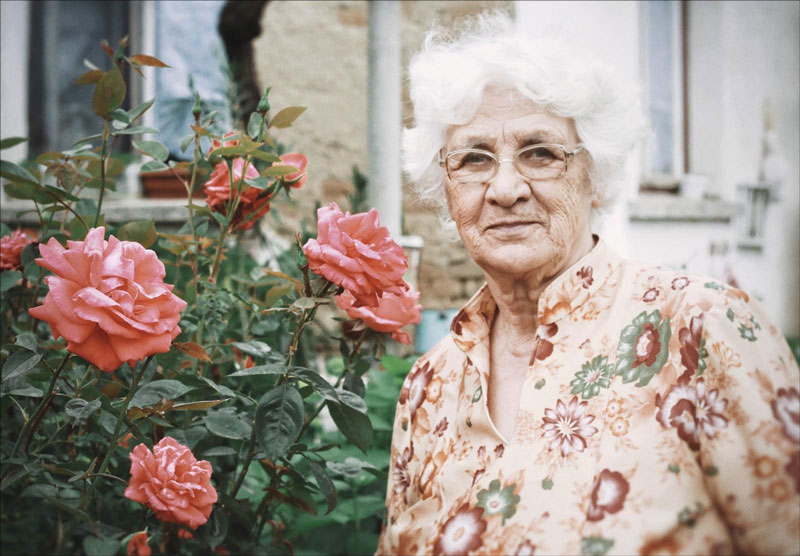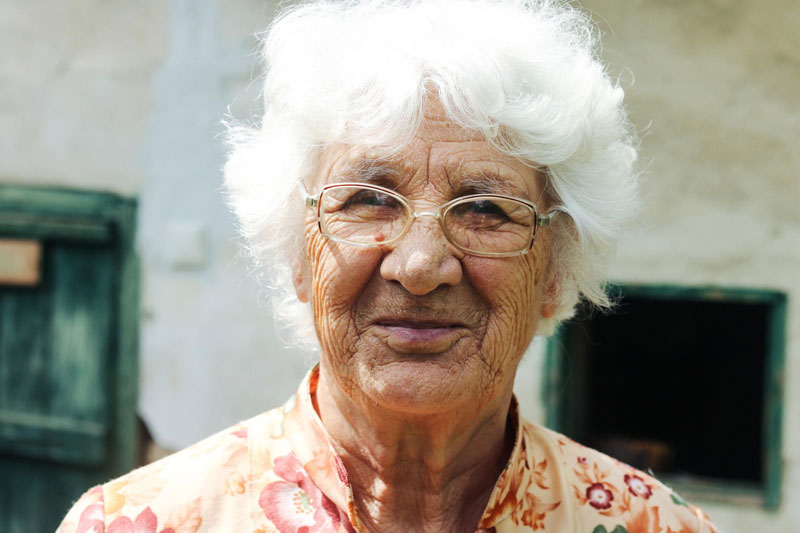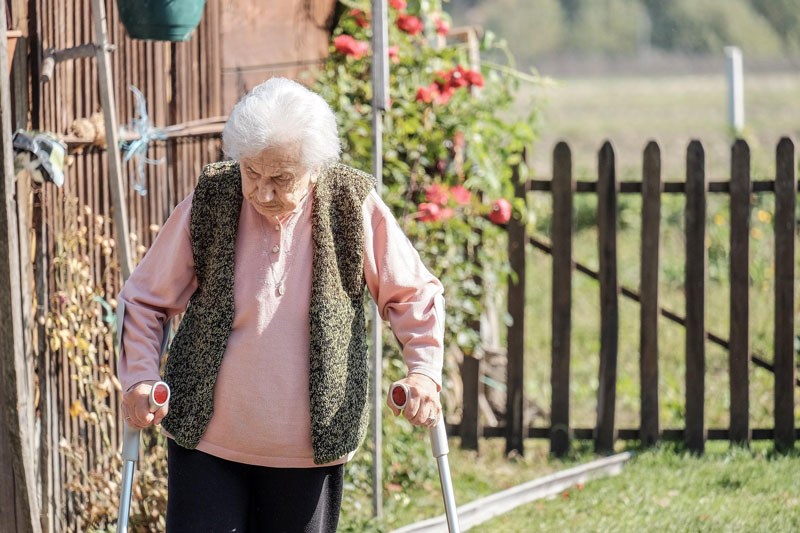Solving a jigsaw puzzle can be confusing. There are many different pieces and the clues are not always obvious. It is often the same with dementia. The condition is puzzling to all those affected – both those diagnosed and their family Carers. This is because dementia, and the home care services required to support it, is not just one thing, it is many.
Unknowing family Carers may quickly define a senior’s memory loss seen in their care for the elderly as dementia. It can be an easy thing to do; however, it may only be partially correct. Family Carers need to dig deeper, better clarify, and understand what specifically they are dealing with and how best to help as a nurse at home in dementia care. For a better visual, family Carers could imagine dementia as an umbrella under which various types of dementias exist. Dementia characteristics can overlap which can easily lead to misunderstandings.
Here are some further facts about the various types of dementia:
Alzheimer’s Disease (AD)

Family Carers will find this to be the most common type of dementia they may be offering in home care for. My father was diagnosed with this condition, so I know it all too well. What began as seemingly innocent absent mindedness with Dad (that the family liked to refer to as “senior moments”) progressed into a much bigger and more serious problem. While conditions for Alzheimer’s vary, family Carers can see many similar responses when providing care for the elderly.
Dad began by forgetting small and simple things as he was ageing in place. In the early stage of Alzheimer’s, he would routinely lose his glasses, rely more on written “to-do” lists, and repeat questions and stories. When moving into the middle stage, Dad forgot more of his shorter-term memories (e.g. his youngest daughter who lived elsewhere and couldn’t visit frequently), became increasingly disoriented, struggled with speaking, and lost much of his balance, flexibility, and body strength. During his advanced Alzheimer’s, Dad became completely reliant on outside help from both his family and supportive long-term in home care staff. I was appointed Joint Guardian and Alternate Trustee for him and was called upon to make decisions for him. At that point, Dad couldn’t recognise his own family nor recall his childhood or career.
As a family Carer for Dad, I learned of the plaques and tangles which can occur in a senior’s brain and lead to Alzheimer’s disease. Plaques resemble a wall as protein molecules bunch together in the brain and block signals/messages from being received. Tangles prevent brain protein strands from remaining straight and can negatively affect nutrient flow. This can be like a maze where the route from start to finish is rarely direct. Another lesson learned was that Alzheimer’s disease can progress slowly or quickly and any in home services engaged need to be across this too.
My sisters and I provided in home care services for Dad for close to 10 years before he passed away. With that said, however, significant losses (e.g. the death of a spouse) or a major move can trigger a faster mental and physical decline in AD patients. In Dad’s case, we had to move him three times with his final home being a secured wing in an aged care facility near me. The lock on the aged care providers door was necessary as wandering in seniors with Alzheimer’s Disease is common, especially at more advanced stages. Despite being under the watchful eyes of the aged care providers in the aged care facility near me, those with Alzheimer’s occasionally still escaped from the building wearing little more than a pair of pajamas. This can become dangerous in colder weather and family Carers must rely on good Samaritans and/or the local police to return their loved one home. Facilities like the aged care facility near me need to resort to other clever means of keeping their residents inside. With Dad’s aged care provider, the elevator doors to the Alzheimer’s wing were painted over to better disguise them.
Family Carers may hear that AD is contagious; this is untrue. Those with Alzheimer’s can still live a good life, feel a family Carer’s love, and benefit from the support of in home care or aged care services strategies for Alzheimer’s disease.
Vascular Dementia (VD)

This is another common type of dementia with strokes often being the underlying cause. A stroke will limit blood flow to the human brain – think of a clogged water drainage pipe. Restricted water flow often leads to nasty flooding; however, blocked blood flow to the brain becomes far more serious as oxygen and nutrients cannot be delivered. If you miss a meal or go hungry, your body will not function properly; a starved brain will respond in a similar manner. Thus, the thinking of a senior ageing in place with this occurring will become fuzzy.
A doctor can explain that heart disease, diabetes, sleep apnea, and/or depression can also be contributing factors for Vascular Dementia. Much like seniors with Alzheimer’s disease, those with Vascular Dementia can be confused, have trouble speaking, misunderstand, and be unsteady on their feet when walking or standing. Two other common signs are abrupt headaches and facial/body paralysis. The side effects of blood clotting, higher cholesterol, and increased blood pressure can be controlled with medications. The support of in home care services such as Home Care Assistance can help to monitor the medication regime.
Frontotemporal Dementia (FTD)

Frontotemporal dementia reduces a senior’s brain functioning abilities. Family Carers may also hear this condition referred to as Pick’s disease. The brain’s nerve cells progressively shrink and become lost. As the condition’s name suggests, the two brain zones hit specifically are the frontal (behind the forehead) and temporal lobes (behind the ears). This is more of a younger persons dementia (hitting those aged 45 – 65) while Alzheimer’s often strikes much later affecting those ageing in place. What can make this form of dementia more mysterious and difficult to identify is that those affected may appear to be functioning more normally for longer periods of time.
An exact cause for FTD has yet to be pinpointed. Doctors can only conduct a series of tests, shortlist the problems, and watch for symptoms including memory loss, behaviour changes, speech problems, and hallucinations, all of which may be delayed until the later stages when in home care services may be in place. Additionally, FTD patients are likely to remember more and remain oriented; this can effectively trick a doctor into believing nothing is wrong. Like Alzheimer’s disease and Vascular dementia, there are medications that may help to treat various side effects experienced. It is best for family Carers to seek advice from a doctor about their concerns.
Lewy-Body Dementia

This condition resembles a dam on a river. The dam blocks the water from flowing. With Lewy-Body Dementia, Lewy bodies (or small protein particles called alpha-synuclein) clot brain neurons and cause them to fail. Instead of river water flowing through, important messages do not run to and from the brain. Therefore, the brain does not receive the necessary information, understand what to do, or know how best to respond for the person ageing in place. The resulting symptoms, as explained by The Lewy-Body Dementia Association, are much like those in other dementias:
- Impaired thinking. A person with Lewy-Body Dementia will lose memories and become unable to process information.
- Movement problems. General body stiffness, tremors, and walking difficulty.
- Visual hallucinations. The senior may see other people or things that do not exist. Hallucinations may also extend with the senior hearing or tasting something that isn’t there.
- Mood changes. Depression, apathy, anxiety, agitation, and paranoia are often witnessed with seniors with Lewy-Body Dementia.
As with other types of dementia, your doctor can tell you more. Medical testing often includes complete neurological and physical exams, a mental abilities assessment, and bloodwork. A more thorough MRI / CT scan or a heart test may also be required. While your doctor may diagnose Lewy-Body Dementia, family Carers need to understand this will not be conclusive.
Medication may help slow the advancement of Lewy-Body dementia; however, it will not completely cure a senior and aged care services or in home care services will be required. A doctor may prescribe a cholinesterase inhibitor (e.g. Donepezil or Aricept). Before starting on one of these medications, family Carers should question the side effects (or even possible side effects) as well as any potential conflicts with other medication they may be providing as part of their nurse at home role. Finding the right medication and dosage may require some trial and error as well.
While there are similarities between Lewy-Body dementia and Alzheimer’s disease, Lewy-Body dementia may become more serious. Researchers from the American Academy of Neurology found that stricken seniors often have worse physical and mental health and a greater disability. This further deterioration – along with a worsened quality of life – can usually be seen two years after the onset of Lewy-Body dementia. In home care and other aged care services become necessary.
Any dementia can have unfortunate consequences. One case of Lewy-Body dementia led to untimely news headlines. Highly acclaimed actor and comedian, Robin Williams, was hit with this disease (this was in addition to Parkinson’s). His widow explained that Williams became overwhelmed by paranoia and could not remember his lines in acting roles. Becoming so troubled while still being cognitively aware is understandable – imagine losing the ability to do something that had once come so easily to you. Williams had pursued several avenues to try and help himself (including medication, exercise, better diet, etc.) but nothing worked. Feeling that there was no other recourse, Williams chose to commit suicide at just 63 years old.
Parkinson’s Dementia

My mother was diagnosed with Parkinson’s disease. While this condition is not fatal, I still like to refer to it as an inconvenience. Mum – always fiercely independent – gallantly fought the increasing limitations of the disease but grew frustrated that she could no longer do what she wanted to do, and aged care providers were sought. As one example, I recall when the care staff at Mum and Dad’s aged care facility near me found Mum in the stairwell. There was no explanation needed…we knew that she had stubbornly determined that she could tackle the eight flights of stairs but found out it was a much harder task than she had imagined due to her weakened condition.
In addition to losing strength and/or stamina, Parkinson’s patients are also affected by:
- Decreased flexibility. This was quickly evident to my sisters and me as our mother didn’t often fully shoulder check when she was driving.
- Increased tremors and reduced gripping strength. Mum’s hands would suddenly shake when she was sitting or reaching out. Grasping and holding onto even small objects was challenging; Mum would often drop items on the floor. In due course, a home care agency recommended we try a “reacher” which proved helpful. This was an extendable rod with fingers that could be opened and/or closed around an object to lift, carry, or move it.

- Handwriting difficulty. We also noted Mum’s handwriting became smaller and much harder to decipher. She struggled to write in a straight line and crowded her words together.
- Speaking volume. Mum’s voice softened to almost a whisper. We considered taking her to a speech therapist but never had the opportunity.
Other symptoms of Parkinson’s disease may include rigidity, bradykinesia (slow movement), and postural instability (balance problems). Physicians examining a senior and observing two or more of these symptoms often diagnose Parkinson’s disease.
Human non-motor skills can also be affected by Parkinson’s disease. The Parkinson’s Foundation identifies other early signs including the following:
- Loss of smell. It may seem hard to imagine, but a person with Parkinson’s disease may lose this sense and be unable to identify even stronger smelling scents.
- Trouble sleeping. Some tossing and turning while in bed overnight is normal. Uncontrollable shaking, flailing about, accidental hitting of a partner in bed, or bad dreams/nightmares can be more problematic.

- Trouble moving or walking. This would result from a combination of reduced muscle strength, flexibility, and balance – all of which may be negatively affected by Parkinson’s disease.
- Constipation. It’s never a pleasant subject of discussion but being unable “to go” (regularly, smoothly, and/or painlessly) may point to a problem.
- “Blank” face. Has your loved one lost his/her familiar smile and, instead, seemingly stares into space and seems unresponsive? Facial expressions (e.g. smiling, frowning, and laughing) all require facial muscles which can be compromised from Parkinson’s disease.
- Dizziness or fainting. Feeling light-headed after getting out of bed or standing up from a chair can suggest Parkinson’s disease. Often, this problem stems from low blood pressure and can be a good reason to see a doctor.
- Stooping or hunching over. With weakened body muscles, a senior ageing in place with Parkinson’s disease may be unable to hold him/herself upright while sitting or standing.
Treatment for Parkinson’s disease includes medication (which increases the brain’s level of dopamine), physiotherapy, and speech therapy. Boxing is also proving to be good therapy for those with Parkinson’s. To help with his diagnosis of Parkinson’s disease, a friend of mine’s husband has taken up the sport and enjoys stepping into the ring. Doing so provides good physical exercise, builds muscle strength, and improves eye-hand coordination. Music therapy for seniors with Parkinson’s has also shown to be beneficial in increasing movement and coordination. These sorts of interventions can be supported by in home care services or aged care services as well.
Other Types of Dementia include Mixed dementia, Wernicke-Korsakoff Syndrome, and Creutzfeldt-Jakob Disease.
Resources
As a leading age care provider, Home Care Assistance offers tailored in-home care services for older Australians, enabling them to live happier and healthier lives in the comfort of their own homes.
We offer private and government subsidised Care Packages and have office locations that are a registered NDIS provider. Our Care Workers undergo extensive training in order to deliver unmatched in-home aged care services where people can continue ageing in place. We are proud ambassadors of the My Aged Care government funded aged care program, enabling Australians to successfully navigate the process and gain approval for in-home care support packages. Home Care Assistance offers hourly care, specialised care, Alzheimer’s and Dementia care, hospital to home care, and 24 hour in home care.










